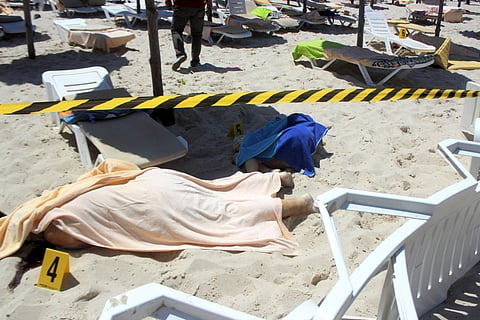Terror must not trample on Tunisian democracy
What should concern Tunisia’s international partners is that the emergence of an inclusive model of development is now trailing behind the demands of security

In the small towns of the Tunisian interior, such as the one where Saif Al Deen Rezgui grew up, young jobseekers face even gloomier prospects now than they did in December 2010, when a struggling street vendor set fire to himself in an act of protest that ignited the Arab spring.
The rate of graduate unemployment is higher in Tunisia than anywhere else in North Africa and it is in part the economic precariousness of life that makes many young people there susceptible to terrorism. Last week, Rezgui, a 24-year-old student from the farming town of Gafour, unleashed a hail of bullets that killed 38 people in the resort of Port Al Kantaoui — among them more Britons than have perished in any other terrorist attack in the past decade.
This is a country of “haves” and “have nots”, the latter mainly in the coastal hinterlands where the Arab spring began. These are the places where austere Salafism find most followers — mostly peaceful, but some of them of a distinctly violent bent.
Reforms intended to tackle Tunisia’s economic disparities have stalled. Local officials struggling to put social and employment initiatives in place in their own areas control only 4 per cent of municipal budgets allocated for these purposes from central state budgets. Eighteen of the country’s 246 municipalities between them received more than half of the money the government sends to local councils in 2013; most of the spoils went to already-affluent coastal cities and their surrounding townships.
Such failings are perhaps inevitable in a democracy as young as Tunisia’s. Until 2011, this was effectively a police state. Conversations were conducted in whispers. Informants were everywhere. It is to the credit of Tunisia’s political elite that the compromises for which they are internationally applauded have kept the country’s democratic transition on track.
However, there are bound to be gaps and many Tunisians have complained about their lack of trust and confidence: In each other, in public institutions and the security forces. Political deals struck in Tunis effectively exclude those outside the capital’s political elite. Official communications and the media are still largely controlled by unregulated outlets and spokespeople, leading to fears that critical decisions will be made behind closed doors, out of reach of democratic scrutiny.
For a month before last week’s attack, social media had been abuzz with the slogan: “Where is our oil?” Protesters demanded to know what contractual arrangements the Tunisian government had made over the exploitation of new discoveries of oil. (Some alleged that the movement was being manipulated by the losing parties in Tunisia’s 2014 elections, above all the Islamist Al Nahda.)
The debate has focused on two things: The continuing lack of transparency in decisions taken by the government over foreign joint investments and the increasingly violent policing of demonstrations in a number of urban centres.
Similar mistrust is directed towards the police force, which has been accorded greater powers in recognition of the sacrifices its members are making in the struggle against terrorism, without doing much to become more effective or accountable. The interior minister has promised redress for the victims of police abuses. But it is unclear just how independent of political interference the police really are.
It is not for the outside world to impose governance arrangements and economic reforms that fail to reflect the aspirations of Tunisians themselves. It is also true that considerably more could have been done to deliver the international financial support promised to Tunisia at the G20 Deauville summit in 2011.
What should concern Tunisia’s international partners is that the emergence of a truly inclusive model of development is now trailing behind the demands of security planners and strident, top-down measures to combat terrorism.
Admittedly, this also reflects the priorities of Tunisia’s international allies, above all the imperative to protect the lives of their citizens abroad. However, during the Troubles in Northern Ireland, the United Kingdom had its own experience of overzealous, and ultimately repealed, counter-terrorist legislation.
If western governments encourage the Tunisian leadership to trample over a system of democratic accountability that has not yet fully taken root, they will make a bad situation worse. The main goal should be to build up the social and economic resilience of Tunisians, to enable them to combat the terrorists in their midst, above all in the still neglected hinterland of Tunisia’s coastal resorts. The writer is a senior research fellow at the Royal Institute of International Affairs
— Financial Times
The writer is a senior research fellow at the Royal Institute of International Affairs.


